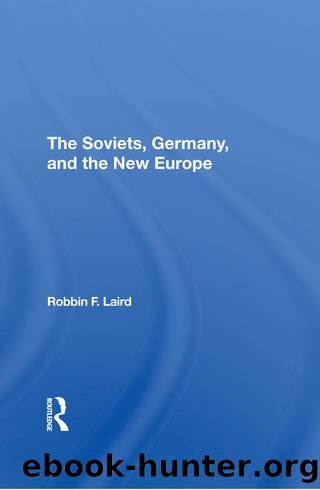The Soviets, Germany, And The New Europe by Robbin F Laird

Author:Robbin F Laird [Laird, Robbin F]
Language: eng
Format: epub
Tags: History, General
ISBN: 9781000305937
Google: gqakDwAAQBAJ
Publisher: Routledge
Published: 2019-07-19T15:56:39+00:00
West Germany's Nuclear Aspirations
Soviet analysts frequently argued that the West Germans had an interest in acquiring nuclear weapons--either through production of their own or through some kind of joint agreement, most likely with France or the United States. With respect to the U.S connection, the issue of a German hand on the "nuclear button" was raised during the controversy over the Pershing-1 As and West Germany's reluctance to include them in the INF negotiations. For example, according to Bovin appearing on the News Today program,
I think the issue of Pershing-1A missiles goes beyond the framework of the arms control negotiations. It has crucial political implications for the future of Europe, and not only of Europe, You know that Federal Germany is forbidden to have nuclear weapons. I think that any attempts to upset this and to give Bonn any hopes of possessing its own nuclear potential is fraught with grave consequences. But Pershings are Americanmade missiles, and their warheads are under American control. But nonetheless I see in Bonn's position not a lack of logic but the deep-seated ambitions to join the nuclear club.... It is clear that through a European nuclear fighting force, Bonn is seeking to gain access to nuclear decisions and nuclear arms.29
Evgenii Grigor'ev had suggested that such nuclear aspirations ultimately threatened the security of Europe:
Why does Bonn need these 72 missiles and, the main question, the nuclear charges for them? It is sometimes said that this is the "bone" which the chancellor has allegedly been forced to throw to the "steel helmet" (the militarist Christian Democratic Union/Christian Social Union faction) for domestic policy reasons. But can the "pacification" of the far right in any NATO country at the expense of European security be tolerated? Can it be allowed to objectively become a demand for unilateral military advantages, moreover in the nuclear sphere? It appears that while officially renouncing nuclear weapons, Bonn actually wants to be a "near-nuclear power" with its finger on the button of nuclear missiles.30
Writing in International Affairs, Igor Borisov argued that either the Pershing-1A warheads were under U.S. control and should therefore be eliminated under the treaty or they were under West German control, which would have been a gross violation of the nonproliferation treaty. He continued his argument: "What would be the reaction in the FRG if the USSR's allies had similar carrier missiles and the nuclear warheads for them were stored close to the launching positions in Soviet depots? In this case, perhaps, Bonn would look at the issue of third countries' weapons in a different way."31 Borisov also postulated that West Germany feared that without the P-1As, it would lose some of its influence concerning NATO's nuclear policy and, he further argued, the FRG had not relinquished its aspirations for its own nuclear weapons.32
In addition to the Pershing-1A issue, Soviet analysts also underscored the nuclear component of the Franco-German relationship. Here, they argued, West Germany sought access to nuclear weapons through a bilateral arrangement. For example, one Pravda article noted
Download
This site does not store any files on its server. We only index and link to content provided by other sites. Please contact the content providers to delete copyright contents if any and email us, we'll remove relevant links or contents immediately.
| Africa | Americas |
| Arctic & Antarctica | Asia |
| Australia & Oceania | Europe |
| Middle East | Russia |
| United States | World |
| Ancient Civilizations | Military |
| Historical Study & Educational Resources |
Red Famine: Stalin's War on Ukraine by Anne Applebaum(2470)
Chernobyl by Serhii Plokhy(2133)
Midnight in Chernobyl by Adam Higginbotham(2081)
The House of Government by Slezkine Yuri(1847)
Midnight in Chernobyl: The Untold Story of the World's Greatest Nuclear Disaster by Adam Higginbotham(1776)
Red Shambhala by Andrei Znamenski(1752)
The Gulag Archipelago (Vintage Classics) by Aleksandr Solzhenitsyn(1730)
From Cold War to Hot Peace by Michael McFaul(1714)
All the Kremlin's Men by Mikhail Zygar(1703)
Putin's Labyrinth(1662)
Red Notice by Bill Browder(1596)
The Future Is History by Masha Gessen(1594)
From Russia with Lunch by David Smiedt(1553)
A People's Tragedy by Orlando Figes(1545)
The Romanovs by Simon Sebag Montefiore(1494)
How to Tame a Fox (and Build a Dog): Visionary Scientists and a Siberian Tale of Jump-Started Evolution by Lee Alan Dugatkin & Lyudmila Trut(1469)
Putin's Labyrinth: Spies, Murder, and the Dark Heart of the New Russia(1457)
The Lost Spy by Andrew Meier(1399)
Art and Revolution by John Berger(1391)
